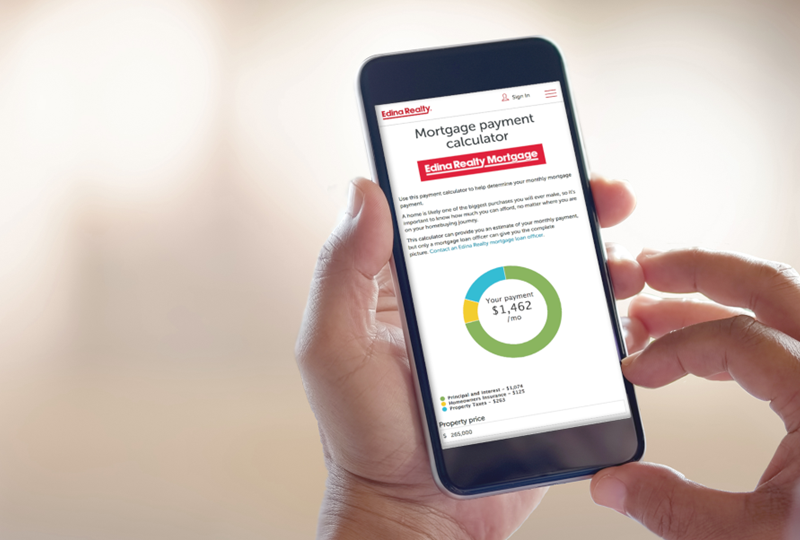
Are your sights set on the home of your dreams, or are you still searching for the perfect place to plant roots? No matter what, it’s a smart idea to begin considering how much you could borrow for a real estate loan. Here are some insights, courtesy of Edina Realty Mortgage, that you can use to calculate your mortgage payment.
Getting started: What you need to calculate your payment
To calculate your monthly mortgage payment using this quick-and-easy mortgage loan calculator, you’ll need to know four numbers up front:
- Price of the property
- Your down payment amount
- Interest rate
- Length of the loan term
After assessing your finances and deciding on a property, the first two variables should be easy to determine.
Determining your interest rate
Edina Realty’s mortgage calculator comes pre-loaded with an interest rate, but your loan’s interest rate will depend upon the specific characteristics of the loan transaction, your credit profile and the market at the time of closing. Remember, mortgage interest rates fluctuate, so it may not be possible to enter the exact interest rate for which you’ll end up qualifying.
Selecting a loan term
Not sure of your loan term? When in doubt, select a 30-year fixed mortgage. This is by far the most common mortgage length; 7 in 10 U.S. mortgages have a 30-year fixed loan term.
Once you’ve entered in these four variables, you’ll receive your estimated monthly mortgage payment.
Want more information on the interest rate you could qualify for?
Edina Realty mortgage loan officers can help. Reach out today for no-obligation assistance from a mortgage specialist.
What comprises my monthly mortgage payment?
A homeowner’s monthly mortgage payment primarily consists of mortgage principal and mortgage interest.
- Mortgage principal is the total balance of the loan, excluding the interest owed. The principal decreases over time, as the borrower makes monthly payments to their lender in order to pay it down completely.
- Mortgage interest is a percentage of the loan amount that the homeowner pays their lender in exchange for borrowing money. Interest rates depend on the market and the financial health of the borrower at the time of the loan’s approval. Rates can be fixed, which means they remain the same for the entire loan term, or adjustable, which means they can change periodically.
Will my mortgage payment fluctuate from month to month?
If you select a fixed mortgage interest rate and pay your monthly loan fee exactly (not more or less) each month, your calculated mortgage payment will remain the same for the length of the mortgage loan.
However, if you select an adjusted rate mortgage (ARM) — rather than a fixed-rate loan — your interest rate may fluctuate with the market. This means that interest rates could change (for better or for worse) over time, and therefore your monthly mortgage payments would change, too.
Last, you may also choose to pay more toward your mortgage each month, if you have sufficient cash on hand. Perhaps you find you can spare extra funds each month, except during September with back-to-school costs and December during the holidays. You could minimize your stress — and shorten the length of your mortgage without having to take on a shorter loan term with an accelerated payment schedule — by contributing more when your budget allows.
Going beyond mortgage payments to include taxes, insurance and other fees
While a mortgage check is the largest chunk of money you’ll pay as a homeowner each month, there are other costs to consider when buying a home. To help you prepare for these costs, the mortgage loan calculator will also indicate your estimated:
- Cost of homeowner’s insurance
- Property tax amount
Worried about saving up a large sum to pay your taxes, or getting hit with an unexpected insurance bill? Don’t be! Most lenders collect estimated tax and insurance payments monthly, as part of the borrower’s mortgage payment. The money is kept in a protected escrow account, and the lender will release the money to pay the borrower’s property taxes and insurance bill on time.
Depending on your loan and the property you purchase, you may also have to budget for other costs, such as:
- Homeowners’ association (HOA) fees. When living in a complex or neighborhood with an association, each tenant contributes a monthly HOA fee to ensure proper upkeep and management of the property.
- Mortgage insurance. Lenders typically require mortgage insurance if the borrower secures an FHA loan or if they select a conventional loan but put down less than 20 percent at closing.
Need help understanding all the terms and jargon — and where you fit in?
Getting a mortgage is a big step that involves a lot of little pieces. By working with a mortgage loan expert that you trust, you can move toward homeownership with minimal stress and confusion.
Reach out an Edina Realty loan officer to get the mortgage help you need.
Additional resources to consider:
Why lenders might require homeowner's insurance on a mortgage loan
How to prepare your finances before getting a mortgage
What is a mortgage?
Types of home mortgage loans








